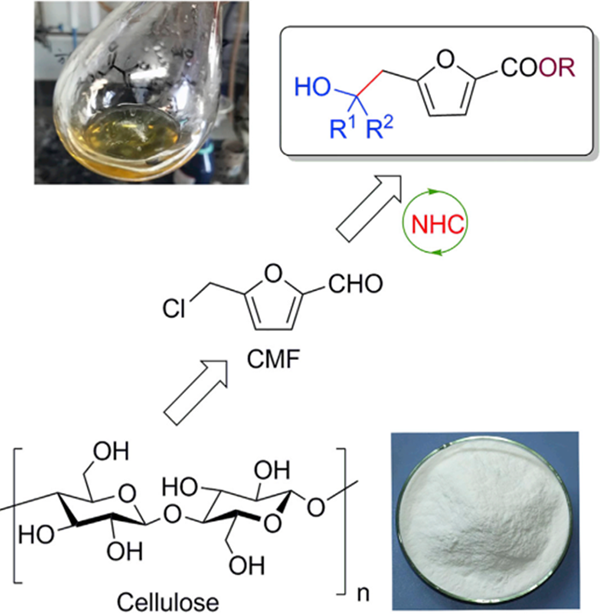Researchers Develop Carbene-Catalyzed Biomass Transformations
Nature produces around 170 billion tons of biomass per year; meanwhile, only 3%–4% of biomass is used by humans. Cellulose is the most abundant component in biomass. Unfortunately, cellulose is indigestible by humans and most animals, and thus the selective transformation of cellulose to high-value-added products is one of the most promising pathways to sustainable society. One interesting application of cellulose is the synthesis of 5-(chloromethyl)furfural (CMF) and its following transformations.
Recently, a research group led by Prof. YE Song from the Institute of Chemistry, Chinese Academy of Sciences (ICCAS) reported that N-heterocyclic carbene (NHC)-catalyzed biomass derived CMF transformations. The work entitled “Biomass Transformation of Cellulose via N-Heterocyclic Carbene-Catalyzed Umpolung of 5-(Chloromethyl)furfural” was published in Cell Reports Physical Science (Cell Rep. Phys. Sci. 2020, 1, 100071). The work has also been patented (CN201911407609X).
Researchers developed the NHC-catalyzed ε-umploung of CMF via challenging dearomatic 1,6-elimination to produce NHC-bound trienolate intermediate. Subsequent nucleophilic addition to carbonyl compounds afforded a series of highly functionalized products with good yields under mild conditions. It is worthwhile to note that the crude CMF, which was easily prepared from cellulose, worked well for the reaction. This reaction provides a new strategy for biomass transformation of cellulose. They believe that this carbene-catalyzed transformation of CMF will facilitate the development of biomass transformations.
This work was financially supported by Beijing National Laboratory for Molecular Sciences, National Natural Science Foundation of China, and Chinese Academy of Sciences.

Carbene-Catalyzed transformation of CMF. (Image by Prof. YE Song)
Contact:
Prof. YE Song
Institute of Chemistry, Chinese Academy of Sciences
Email: songye@iccas.ac.cn





